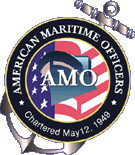 Section Front Front Page |
 | |||
|
| |||
| MSP renewal leads agenda at
SIUNA convention | |||
| Resolutions call for enhanced U.S.-flag ship promotion program, maritime tax parity | |||
Also prominent in discussion was a pending measure intended to ease the U.S. merchant fleet's competitive position in foreign trade through tax and regulatory reform, including an income tax exemption on a portion of shipboard wages earned abroad. But the MSP was the most urgent issue taken up by the SIUNA delegates, who met at the Seafarers' Paul Hall Center for Maritime Training and Education. Authorized in the Maritime Security Act of 1996, the Maritime Security Program provides limited direct operating assistance each year to a limited number of U.S.-flag roll-on/roll-off, container and LASH vessels serving commercial foreign trade markets. In exchange for the aid, the ships, their crews, and all intermodal and logistics support systems owned or leased by participating companies are available on demand to the Department of Defense for use during national security emergencies. But, as the SIUNA delegates noted in a resolution, the MSP has only "a few years remaining." Under the authorizing statute, the program will expire in September 2005. In the resolution, the SIUNA urged Congress and the administration to support the early reauthorization and practical overhaul of the Maritime Security Program as recommended July 16 by the SIUNA, American Maritime Officers, the International Organization of Masters, Mates and Pilots and the Marine Engineers Beneficial Association in joint testimony before the House Armed Services Committee's Special Oversight Panel on the Merchant Marine, chaired by California Republican Rep. Duncan Hunter. The proposal was endorsed by major U.S.-flag ship operators during the Capitol Hill hearing. Under the proposed legislation, the MSP would be renewed for 20 years, the maximum number of participating vessels would increase from 47 to 60, and the operating stipend for each ship would rise from $2.1 million a year to $3.5 million a year. The SIUNA resolution said enactment of the recommended measure would encourage new private investment in militarily useful U.S.-flag merchant ships, sustain and create jobs for American merchant mariners, and provide DOD with additional ships and civilian seagoing manpower for strategic sealift in distant crises. Officers and crews would be available for both the MSP fleet and government-owned front-line sealift ships and Ready Reserve Force vessels, the resolution added. "We cannot afford to wait until the last minute to extend and build upon the current program for a number of reasons," the resolution said. "Vessel owners and operators will need time to replace some of their vessels they will enroll in a new MSP. By the time the current program is scheduled to expire, some of the MSP ships will be due for substitution, and such operations take time to plan and execute--we must start now to provide for a strong merchant fleet for the 21st Century." The continuing war against terrorism worldwide makes early MSP reauthorization even more urgent because each U.S.-flag merchant ship calling at a U.S. port means one less foreign-flag ship and the security risks it presents, the SIUNA resolution continued. "No one would disagree with the fact that U.S.-crewed, U.S.-flagged ships ... are safer and more desirable than their foreign counterparts." The resolution described the Maritime Security Program as "cost-effective," a "key element of U.S. economic and defense security," and "an underpinning" of national maritime policy. The program yields economic and national security benefits "at a price well below" what it would cost the federal government to achieve "with a fleet of its own." In a separate resolution on the tax and regulatory reform issue, the SIUNA delegates called for enactment of H.R. 3262, the Maritime Cost Parity Act. The legislation was sponsored by Alaska Republican Rep. Don Young and Minnesota Democratic Rep. Jim Oberstar, chairman and ranking minority member, respectively, of the powerful House Transportation and Infrastructure Committee. The resolution pointed out that U.S.-flag ship operators "are subject to significantly higher taxes than their foreign-based counterparts," and that, unlike American citizens employed overseas in other industries, U.S. citizen seafarers working in foreign markets must pay taxes on all of their earned income. Noting the worldwide proliferation of flag-of-convenience ship registries since the end of World War II, the resolution said FOC states offer "extremely favorable tax advantages" to shipowners in the U.S. and other industrialized countries. "In addition, many other foreign shipping companies pay virtually no income taxes as a result of shipping income tax exemptions, deferral devices and accelerated depreciation." As a result, the U.S. and many of its traditional seafaring allies have suffered the loss of ships and jobs, the resolution continued. But, unlike many of its allies, the U.S. "has been slow to respond--America continues to witness the erosion of the U.S.-flag fleet and the subsequent loss of employment opportunities for American seafarers." The commercial U.S.-flag fleet is "subject to a multitude of U.S. government-imposed rules, regulations and tax obligations that are not applicable to the foreign-flag and foreign-crewed vessels against which they must compete in America's foreign trade." H.R. 3262 would correct that by reducing tax, insurance, vessel inspection and wage costs borne under the U.S. flag, the resolution said. Specifically, H.R. 3262 would replace traditional income taxes on shipping profits with an optional flat tax based on tonnage. Greece, Norway, the Netherlands, Germany and Great Britain have adopted the flat tax with "impressive" results, the resolution said. "The British merchant fleet alone has increased 40 percent due to changes in maritime tax policies." H.R. 3262 would also exempt "income earned by American seafarers on U.S.-flag vessels engaged in international commerce from federal taxes to the same extent as is the income of other Americans working abroad." In addition, H.R. 3262 would exempt U.S.-flag merchant vessels from U.S. Coast Guard design standards as long as the vessels meet the less expensive standards of the International Maritime Organization in the United Nations. The bill would also allow U.S.-flag shipowners to adequately compensate for on-the-job injury or death through insurance, with minimum levels of liability coverage to be established by the Secretary of Transportation. "It is important for Congress and the Bush administration to take decisive action to reverse the decline in America's commercial sealift capability," the SIUNA resolution concluded. "The meaningful maritime-related tax and regulatory reform proposals contained in H.R. 3262 must be enacted in order to supplement other domestic maritime policies, such as the Maritime Security program and cargo reservation statutes. Without these recommended changes, the ability of U.S.-flag merchant vessels to serve as the nation's 'fourth arm of defense' is placed at risk." In other resolutions, the SIUNA delegates:
| |||
| Front Page |
